Tales of a Fourth Grade Dissident
TL/DR: If someone doesn’t want you to read it, buy two copies... just to be safe.
I was nine when I discovered Judy Blume. After Are You There God? It’s Me, Margaret, I was officially hooked, devouring Otherwise Known as Sheila the Great, Starring Sally J. Freedman as Herself, Blubber, Tales of a Fourth Grade Nothing, Deenie, and Freckle Juice like a stray cat in a fish factory. I went from spending every penny of my allowance on the irresistible “mystery bag ‘o crap” at Spencer—yes, I would trade actual currency for a sealed sandwich sack that could contain any combination of gags and gadgets including fake dog poop, fuzzy dice, wax lips, and if you were lucky, a mood ring or Scooby-Doo keychain—to collecting Blume books as if they were rare, priceless artifacts.
One day as I was reading my latest literary acquisition, I came across an unfamiliar word.
“Hey, Mom,” I bellowed toward the nearby kitchen where she was cooking. “What does m-a-s-t-u-r-b-a-”
I didn’t get to finish. Mom teleported herself to my side, ripped that copy of Forever out of my hands, and was halfway down the hall with it before my prepubescent brain could process what had just happened.
“What are you doing?” I cried. “I paid for that with my own money!”
“Well, it’s not appropriate,” she announced before disappearing with the purloined and clearly pornographic paperback.
“Will you at least tell me what that word means?” I shouted after her, having already forgotten the provocative term so I couldn’t even look it up myself.
Silence.
“Hello?”
Spoiler: She would not.
[In Mom’s defense, the subject matter may have been a little mature for me. But also, how hard would this have been: “That’s a grown-up word that has to do with private parts. Do you want to talk about it now or wait until you’re a little bit older?” Why were parents in the 1970s physically and emotionally incapable of awkward conversations? As often, I digress.]
In my tender mind, two things were immediately and unequivocally certain: There was something exceptionally juicy in that book, and I was going to do whatever it took* to get my hands on another copy.
*whatever it took consisted of scrimping for another few weeks, taking the godforsaken bus to the mall, re-purchasing the forbidden treasure, ravishing as many pages as I could when Mom wasn’t around, and tucking it deep into the secret pocket between my mattress and box spring when she was. Such was the life of a subversive 1978 word nerd.
I was thinking fondly of my first hands-on experience with book banning and censorship when my friend (and fantastically talented Yankee Doodle Soup contributor) Frances sent me the following piece from the Defender:
Obviously, I knew all about how the government had pressured social media platforms to censor anti-narrative content during the pandemic. And when The War on Ivermectin was first released, I quickly discovered Amazon had made the title a chore to find (you literally had to type out the entire title before it would appear in the search results; none of my other books had ever experienced this little “glitch”). But—and call me ignorant, naïve, or both—it hadn’t dawned on me that the White House was telling Amazon which books it could should and couldn’t shouldn’t promote.
Of course the White House was telling Amazon which books it could should and couldn’t shouldn’t promote.
According to the report, former White House senior adviser for COVID-19 response Andrew Slavitt contacted Amazon for help with “the high levels of propaganda and misinformation and disinformation” on the site. “If you search for ‘vaccines’ under books, I see what comes up,” Slavitt reportedly said in an email. “I haven’t looked beyond that but if that’s what’s on the surface, it’s concerning.”
Amazon initially responded as anyone in the business of selling shit-tons of books would: asserting that publications that question the efficacy of vaccines did not violate the online megastore’s policies. Then the White House requested a meeting with Amazon staff, and—presto, change-o!—the internal “Do Not Promote” label was born. Forty-three books were specifically chosen for online invisibility, including the famously eye-opening Dissolving Illusions and surprisingly, omitting the equally illuminating Turtles All the Way Down (and, I’ll add, The War on Ivermectin, which frankly I find slightly offensive).
“Whether you love or hate the books on this list,” Republican Representative Jim Jordan said in a tweet, “no bookstore should be censoring books because of government pressure.”
Representative Jordan followed up his initial tweet with this accurately delicious dig:
Just as Mom’s cinematic confiscation of Forever had increased its appeal by roughly ten thousand percent, the banned-on-Amazon catalog doubles as a handy shopping list for folks in the market for truth.
Speaking of truth, last month the US House of Representatives released an 800-page report on “how top Biden White House officials coerced big tech to censor Americans, true information, and critics of the Biden Administration.” From the report, as if anyone with a lick of common sense doesn’t comprehend this on a cellular level already:
“By suppressing free speech and intentionally distorting public debate in the modern town square, ideas and policies were no longer fairly tested and debated on their merits. Instead, policymakers implemented a series of public health measures that proved to be disastrous for the country. From unnecessary extended school closures to unconstitutional vaccine mandates that forced workers to take a newly developed vaccine or risk losing their jobs, the Biden Administration and other officials needlessly imposed harm and suffering on Americans across the country.”
You don’t say.
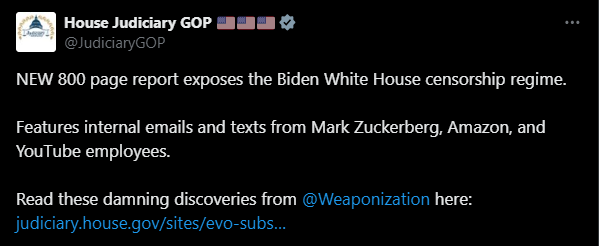
I didn’t think there was a rabbit hole on earth I hadn’t tripped over or at least peered into until I learned about Amazon “founder” Jeff Bezos’ grandfather, Lawrence Preston Gise. As much as everyone loves a good dude-just-diddling-around-in-his-dorm-room success story, apparently gramps was instrumental in the founding of the agency that developed the internet and would later become DARPA (the Defense Advanced Research Projects Agency operated by the Department of the Defense).
According to Leading Report’s Patrick Webb, "There has long been speculation that DARPA has been involved in the creation of many popular big tech companies, using "frontmen" for the allusion [sic] of a startup led by outsiders." (Think Mark Zuckerberg, Bill Gates, Elon Musk.)
All of which is to say it’s probably safe to assume the government has had it’s slimy, self-serving hand in any and every influential American industry for far longer than loads of folks realize. And that, of course, begs the ultimate question: What can we do about it?
The ZeroHedge story linked above is illuminating, but the real insight is in the comments. For example, this one, in response to another woebegone poster who wrote, “Musk? Deep State? Trump? Deep State? Alex Jones? Deep State? So there are ‘zero heroes’? Such a bleak world. :/”
TheUnderdog succinctly and eloquently sums up what we all can (and must) do if we want any hope of clawing our way out of this mess: Give, come forward, form militias, refuse to bow, revolt, bang drums, be heroic. As Margaret Mead advised, "Never doubt that a small group of thoughtful, committed citizens can change the world; indeed, it's the only thing that ever has."
That and maybe a few epic books.
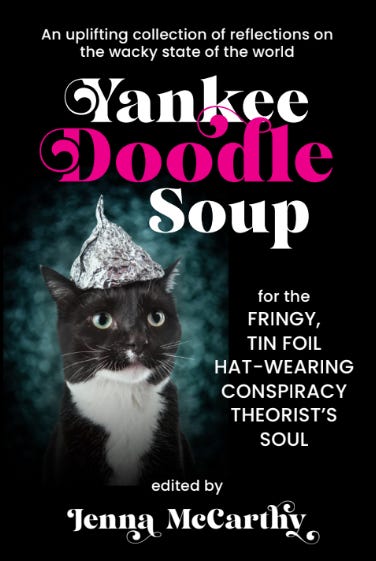
Dropping SOMETIME TODAY: My interview with The Remedy Revolution Podcast (on Apple, Spotify, and anywhere else kickass podcasts live), where we talk all things conspiracy, COVID, and Yankee Doodle Soup! Tune in and share. :)




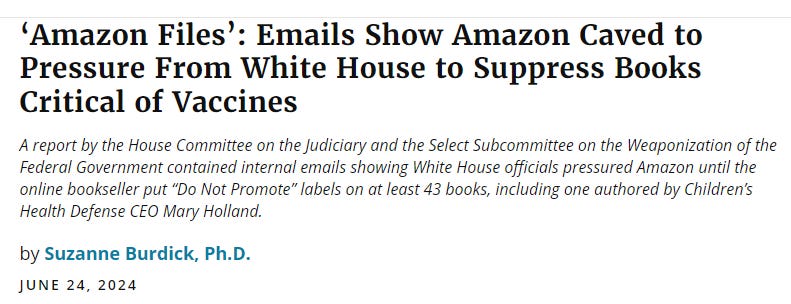



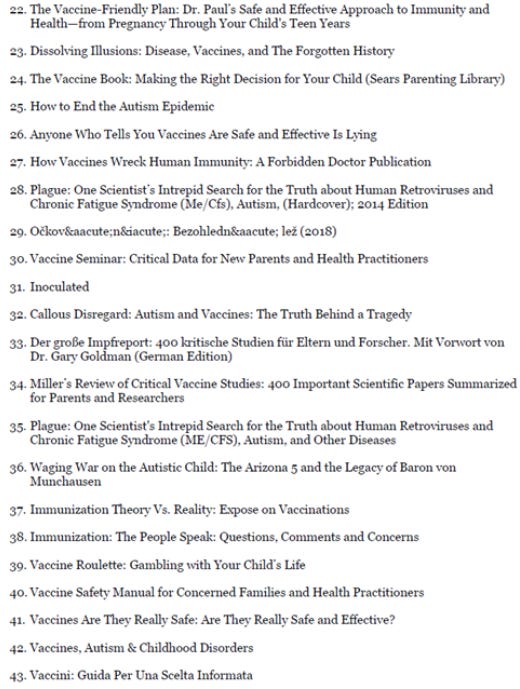


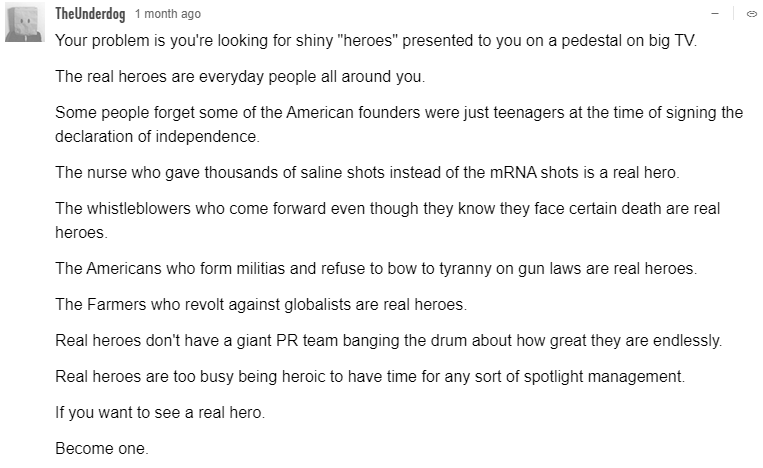
I do buy many of my books from Amazon sadly but I figure it’s a way of telling them that there are people out here who want these kinds of books. AND when I go into Wellesley Books in Maskachusetts , they never have any books I want. So I make them order them. I also order so many authors’ books to support them. Even if I don’t read them all, I have quite an extensive library of books that would throw any liberal into anaphylaxis! The War on Ivermectin is one of my faves.
Ahh...nailed it with one comment, "The real heroes are the everyday people all around you" who take action based on their individual common sense. We do this every day 24/7 and rarely recognize how important this is to a society dedicated to fairness.